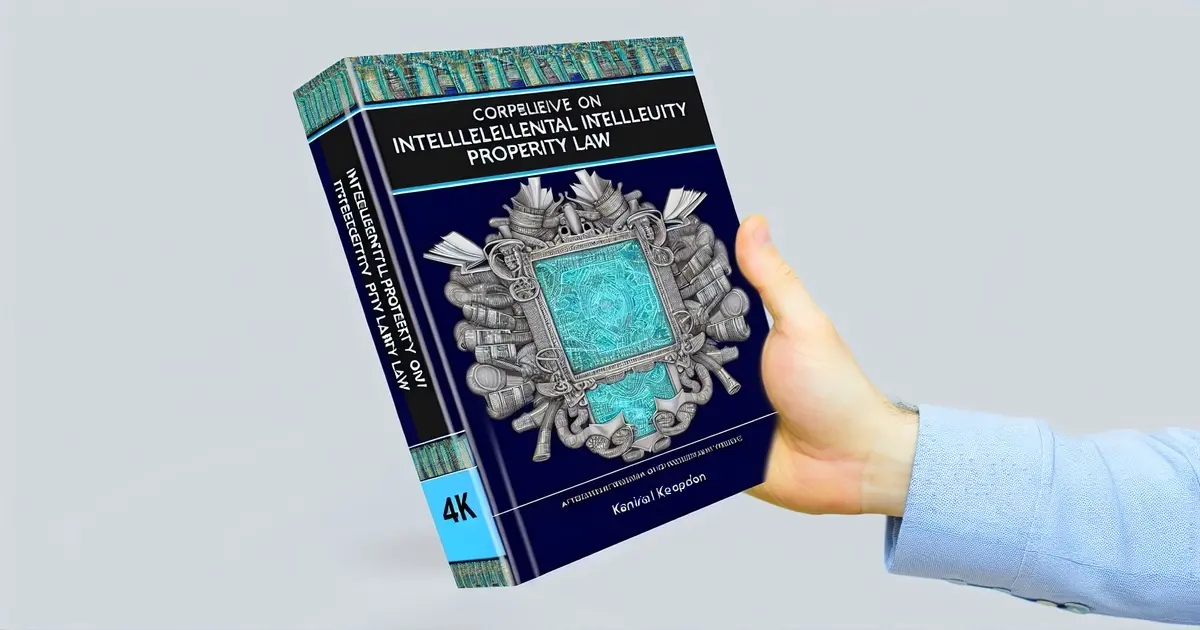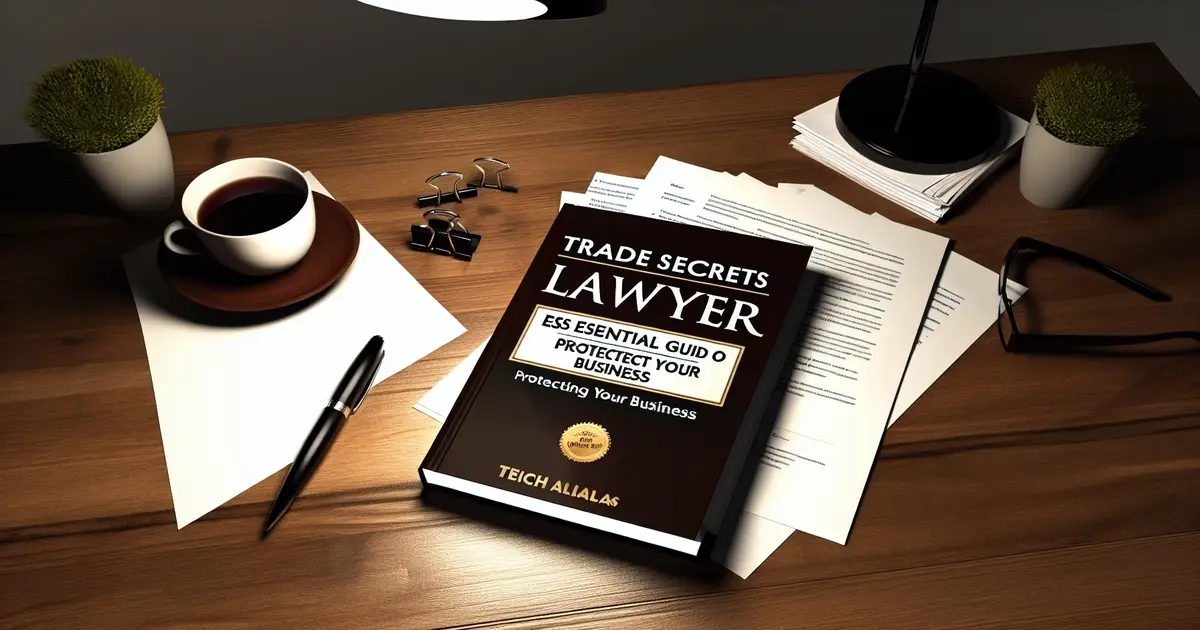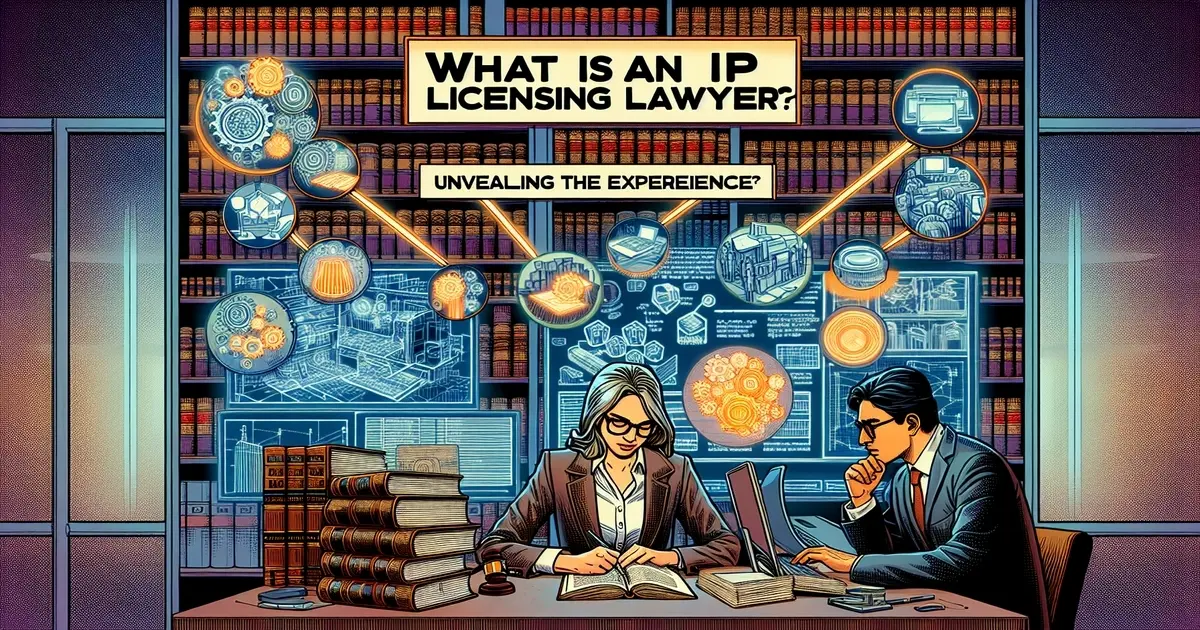Intellectual Property Lawyers: A Comprehensive Guide to IP Law
Who stands guard over the fortress of your creative genius or innovative breakthroughs, offering legal talent and counsel to help advance your career? Enter the realm where intellectual property lawyers, showcasing legal talent in their career, shine as unsung heroes at firms, safeguarding the jewels of your intellect from potential siege as counsel. In a world buzzing with fresh ideas and cutting-edge inventions, these legal guardians, including law firms and counsel, ensure that your intellectual assets receive the protection they deserve, turning them into powerful tools for business growth and competitive advantage.
They're not just attorneys but the counsel and architects building robust walls around your career, ensuring your work remains unequivocally yours. So, if you've ever pondered how to shield your creations from prying eyes or plagiaristic hands in your career, it's time to dive deeper into understanding their pivotal role and seek counsel.
Table Of Contents
Understanding Intellectual Property Law
Types of IP
Intellectual property law covers creations from the human mind. These include patents, copyrights, trademarks, and trade secrets. Each type serves a unique purpose.
Patents protect inventions for a period. This allows inventors to benefit from their work without fear of copying. For example, a new kind of engine or software can be patented.
Copyrights cover artistic and literary works like books, music, and movies. They ensure creators control how their work is used worldwide.
Trademarks safeguard symbols, names, and slogans to identify goods or services. Think about logos that distinguish brands in the market.
Trade secrets involve business practices or recipes not known to the public. Keeping these secrets gives companies an edge over competitors.
Importance of Protection
Protecting intellectual property is vital for innovation and economic growth. It motivates people to develop new ideas, knowing they will benefit from their creativity.
Without protection laws, anyone could copy someone else's invention without permission or payment. This would discourage creativity and slow down progress in various fields.
For instance, if moviemakers knew others could freely distribute their films without consent or compensation, they might not invest time or money into making movies.
Global Variations
Intellectual property laws vary worldwide, which sometimes complicates international commerce.
In some countries, patent protections are strong, which encourages local innovation but may limit access from abroad.
Other nations have more robust enforcement mechanisms, making it easier for foreign businesses to protect their intellectual assets within those borders.
Balancing rights in intellectual property law is crucial for encouraging creation without preventing wide use. Advocates argue that well-balanced IP laws stimulate innovation and economic progress by ensuring creators can profit from their inventions while allowing others access at fair prices after specific periods.
Role and Responsibilities of IP Lawyers
Advising Clients
Intellectual property lawyers play a crucial role in guiding individuals and businesses. They help clients understand the importance of protecting their creative works, inventions, and brand identities. This advice is foundational to securing an entity's intangible assets.
Firstly, these legal experts assess what specific aspects of a client’s work can be protected under intellectual property laws. They consider various factors like originality, utility, and market value. For example, they might suggest patent protection for a new invention or copyright for original literary works.
Secondly, IP lawyers provide strategic counsel on maintaining the exclusivity of these rights over time. They often recommend regular monitoring for potential infringements and advise on renewing protections periodically.
Drafting Applications
A significant responsibility of intellectual property lawyers involves drafting and filing applications with relevant authorities such as the United States Patent and Trademark Office (USPTO). This process requires meticulous attention to detail.
Drafting an application includes describing the invention or creation clearly and convincingly to meet strict criteria. It often involves complex technical language tailored to each case—for instance, detailing every aspect of an innovative machine's design in a patent application.
Next comes applying correctly—this means choosing the right kind of protection (patent, trademark, copyright) based on the nature of the intellectual asset. Mistakes here can lead to delays or rejections.
Representing Clients
IP lawyers effectively represent interests when disputes arise over intellectuals or when negotiations are necessary for licensing agreements.
In disputes regarding infringement claims—the assertion that someone else is unlawfully using your protected idea—lawyers navigate through litigation processes or alternative dispute resolution methods like mediation. For negotiations involving licensing agreements where two parties agree on utilizing one’s intellectual property under certain conditions—these attorneys ensure fair terms that protect their client's rights while allowing beneficial use by others.

Essential Skills for Intellectual Property Lawyers
Legal Research
Intellectual property lawyers must be proficient in detailed legal research. This skill is crucial for understanding the complexities of intellectual property law. They need to analyze previous cases, statutes, and regulations that might affect their client's case.
Legal talent shines through in this aspect of practice. The ability to sift through vast amounts of information quickly and accurately can set apart a good lawyer from a great one. It involves not just reading but understanding and applying complex legal principles to real-world situations.
Negotiation Skills
Strong negotiation skills are another cornerstone for intellectual property lawyers. These professionals often find themselves at the negotiating table, discussing licensing agreements or settlements. They aim to secure the best possible outcome for their clients while respecting the laws and rights involved.
Negotiating requires a deep understanding of what both parties want and finding common ground to reach agreements. This balance is delicate but essential in protecting clients' creations without infringing others' rights.
Technical Understanding
Understanding complex technical subjects is vital for intellectual property lawyers who deal with inventions or works that require specific knowledge.
- For example, a lawyer working with pharmaceutical patents needs an adequate understanding of chemical compounds.
- Similarly, those dealing with software patents must grasp coding principles.
This range of knowledge helps them better represent their clients because they understand the intricacies of what they're trying to protect.
Educational and Certification Requirements for IP Lawyers
Juris Doctor Degree
Intellectual property lawyers need a Juris Doctor (JD) degree. This is their first big step. They must attend an accredited law school. It takes about three years to complete.
Getting into law school requires a bachelor's degree first. Any field can work, but some are more helpful than others. Fields like engineering or science are great if you're aiming for patent law.
Bar Examination
After getting their JD, future IP lawyers face the bar exam. This is a tough test that varies by state.
Passing the bar lets them practice law in that state. Each state has its own rules and subjects on the exam. Preparation is critical, often requiring months of study.
Patent Law Certifications
Some IP lawyers focus on patent law. They need extra certifications for this.
Firstly, they must pass the USPTO (United States Patent and Trademark Office) exam. This allows them to file patents on behalf of inventors. Secondly, having a background in science or engineering helps here, too. This knowledge makes understanding inventions easier.
- To summarize:
- Earn a Juris Doctor degree from an accredited school
- Pass your state’s bar examination
- For patent law: Pass the USPTO exam; A science or engineering background helps
These steps ensure intellectual property lawyers are well-prepared to protect creative works and innovations.
Specializations within Intellectual Property Law
Patent Law
Patent law is the first significant area within intellectual property. It focuses on protecting inventions. This means inventors can keep their creations safe from unauthorized use. Intellectual property attorneys specializing in patents help clients get these protections.
They work with inventors to file patent applications. This process involves a lot of detailed paperwork and legal knowledge. The goal is to secure a patent that grants the inventor exclusive rights to their invention for a certain period.
Copyright Law
Copyright law comes next, focusing on protecting authors, artists, and creators. This specialty covers works like books, music, movies, and art. Copyrights give creators control over how their works are used and shared.
Intellectual property attorneys in this field guide clients through copyright registration processes. They also handle cases involving copyright infringement or disputes about ownership rights.
Trademark Law
Trademark law is about safeguarding brand identities through logos, names, and slogans that distinguish goods or services from others. Brands are crucial assets for businesses as they build consumer recognition and trust.
Specialists in trademark law assist clients with registering trademarks to protect brand identity legally. They also deal with issues like trademark infringement or dilution, where someone else uses a similar mark in a way that could confuse customers.
Protecting Intellectual Property Assets
Confidentiality Agreements
It's essential to implement confidentiality agreements. These legal documents ensure that sensitive information stays within the company. They prohibit employees and partners from sharing secrets.
Confidentiality agreements protect trade secrets and business strategies. This protection is vital for maintaining a competitive edge. These agreements are necessary for businesses to retain their unique advantages.
IP Audits
Conducting regular IP audits helps identify assets needing protection. It's a thorough examination of a company's intellectual property portfolio.
Audits reveal gaps in protection and ownership issues. They also highlight opportunities to strengthen IP rights through patents or trademark registration. Regular audits align intellectual property management with business objectives, ensuring that all developments are adequately protected.
Registering Rights
Registering IP rights with governmental bodies solidifies ownership and protection against unfair competition.
- For patents, it grants exclusive rights to inventions.
- Trademarks protect brands, logos, and slogans.
- Registration provides legal evidence of ownership and deters potential infringers.
Businesses benefit from registering their intellectual property internationally as well. This global safeguard supports those operating in international markets or planning expansion.
Intellectual Property Litigation Process
Filing Lawsuits
Intellectual property lawyers start by filing a lawsuit. This happens in federal courts. The step is crucial for enforcing IP rights and defending against infringement claims.
First, the lawyer drafts a complaint. This document outlines the case's basis. It mentions how the other party violated your intellectual property rights. After filing, the court process officially begins.
The defendant then gets a chance to respond to these allegations. They can admit guilt, deny it, or claim insufficient knowledge to accept or reject it.
Pre-Trial Procedures
The discovery phase comes next in pre-trial procedures. Both parties exchange information during this stage. They share documents and evidence related to the case.
Lawyers also engage in drafting motions during this phase. Motions are formal requests made to the court before the trial starts.
- For example, A motion might ask for specific evidence not allowed at trial.
This phase aims to narrow down issues for trial.
Trial and Appeals
When cases reach the courtroom, presenting them is critical.
- Lawyers argue their points before a judge or jury.
- Witnesses may testify about the facts of the case.
After hearing all sides, judges or juries make decisions based on presented facts and law applications.
If either side disagrees with trial outcomes, they can file an appeal.
- Appeals go to higher courts like the Federal Circuit.
Appeals focus on legal errors that could have affected verdicts.

Choosing a Specialized IP Law Firm or Lawyer
Experience Matters
Experience in specific IP areas is crucial when looking for intent lawyers. Not all legal professionals have the same expertise across the diverse landscape of intellectual property law. Some might be more versed in patents, while others excel in trademarks or copyrights.
I want to tell you that finding a lawyer or law firm with significant experience relevant to your needs is essential. For example, choosing someone who has successfully navigated numerous patent cases can make all the difference if you're dealing with a complex patent issue. This specialized knowledge ensures they understand the nuances and can provide tailored advice.
Track Record
Assessing a lawyer's track record is another critical step. Could you look into their history with cases similar to yours? Success rates speak volumes about their capability and strategic approach to litigation.
Law firms often share case studies or success stories on their websites. These can give you insight into their performance and how they've helped past clients achieve favorable outcomes. It also indicates they have practical trial experience, which could be pivotal if your case goes to court.
Compatibility Counts
Finding an intellectual property lawyer isn't just about credentials; compatibility matters, too. Your chosen legal professional should align with your communication style and expectations.
Some clients prefer direct and frequent updates, while others may want only essential communications regarding significant developments. Before committing, discuss how you’ll communicate throughout your partnership:
- Preferred methods (email, phone calls)
- Frequency of updates
- Level of detail expected
This upfront clarity helps prevent misunderstandings later on.
Cost Considerations for Hiring IP Lawyers
Billing Practices
Understanding the billing practices of intellectual property lawyers is crucial. They generally offer three types: hourly rates, flat fees, and contingency fees.
Hourly rates mean you pay for every hour your lawyer works on your case. This can add up quickly but is transparent.
Flat fees are a one-time charge for specific services. This makes budgeting more accessible as you know the cost upfront.
Contingency fees imply that the lawyer gets paid only if you win your case, taking a percentage of the award or settlement. While this can save money initially, it might result in higher costs if you win big.
Additional Costs
Budgeting for extra expenses is necessary when hiring an IP lawyer. These include filing fees and litigation expenses, which can significantly increase overall costs.
Courts or patent offices require filing fees to process your documents. They vary based on the type of intellectual property application and jurisdiction but are usually unavoidable.
Litigation expenses cover everything from court costs to paying expert witnesses during a trial. These can be unpredictable and expensive, requiring careful financial planning.
Value vs Cost
Weighing the cost against potential value is essential when hiring an intellectual property lawyer.
Protecting or enforcing IP rights could bring significant long-term benefits, like preventing competitors from using your innovations or recovering damages through litigation.
However, these benefits must be balanced with immediate financial implications, including legal fees and additional expenditures mentioned earlier.
Summary
Navigating the maze of intellectual property law can seem like a Herculean task, but with the correct IP lawyer by your side, it's more like having a map and a flashlight in a dark cave. Whether you're patenting an invention, copyrighting your latest novel, or fighting off copycats, understanding the role, skills, and how to choose your legal champion is crucial. It's not just about safeguarding your brainchild; it's about recognizing and rewarding your creative and innovative contributions. Remember, investing in a skilled IP lawyer isn't an expense—it's securing your legacy in the sands of time.
So, what's your next move? If you're ready to protect what's rightfully yours and keep your intellectual treasures safe, it's time to find an IP lawyer who doesn't just talk the talk but walks the walk. Dive into intellectual property law confidently and let your ideas shine bright for the world. Your masterpiece deserves no less.
Frequently Asked Questions
What does an intellectual property lawyer do?
An IP lawyer protects your creative works like inventions, trademarks, and designs. They're the guardians of your brainchild, ensuring others don't misuse or steal it.
Why are specialized skills necessary for IP lawyers?
IP law is intricate. Lawyers need a sharp eye for detail and a deep understanding of legal and technical matters to navigate this complex field effectively.
What education do you need to become an IP lawyer, a career sought by many legal professionals and trial lawyers seeking to showcase their legal talent?
To wave the IP law banner, one must complete law school focusing on intellectual property courses. Then, passing the bar exam is your ticket.
Can I handle my intellectual property protection?
While you can take initial steps yourself, navigating the maze of IP laws requires a professional's touch. Think of it as needing a pilot to fly; you wouldn't wing it alone!
How do I choose the right IP law firm or lawyer to counsel clients with trial lawyers and legal professionals possessing exceptional legal talent?
Please look for experience and specialization in your specific area of need within IP law. It’s like picking a surgeon; you want someone who’s done it hundreds of times before.
Is hiring an intellectual property lawyer expensive?
Costs vary widely based on complexity and location, but think of it as investing in armor for your creative knight—it's worth every penny to protect against potential threats.
Related Post
IP Litigation Lawyer
In the fast-paced world of innovation and creativity, protecting your intellectual property (IP) has never been more crucial. Enter the IP litigation lawyer, a specialized legal eagle who swoops in to defend your inventions, brand names, and artistic works from infringement and misuse.
Read MoreTrademark Lawyer
Have you ever wondered who, after a thorough trademark search and navigating the trademark application process with a trademark law firm, guards the uniqueness of your brand as a registered trademark?
Read MoreCopyright Lawyer
In the digital age, where content creation and distribution over the internet are at an all-time high, a staggering 90% of creators will face copyright issues with their original work during their careers, often involving patents and documents.
Read MoreTrade Secrets Lawyer
Have you ever wondered how enterprises keep their secret sauce, or commercial information, under wraps through patent protection and avoid commercial espionage?
Read MoreIP Licensing Lawyer
Have you ever wondered who stands guard over the fortress of intellectual property, ensuring that inventors, creators, and licensors reap the rewards of their innovation through licenses?
Read MorePatent Lawyer
Over 300,000 patents are filed in the United States each year, highlighting the critical role of patent lawyers in innovation and intellectual property protection.
Read More






